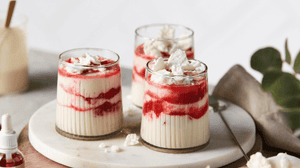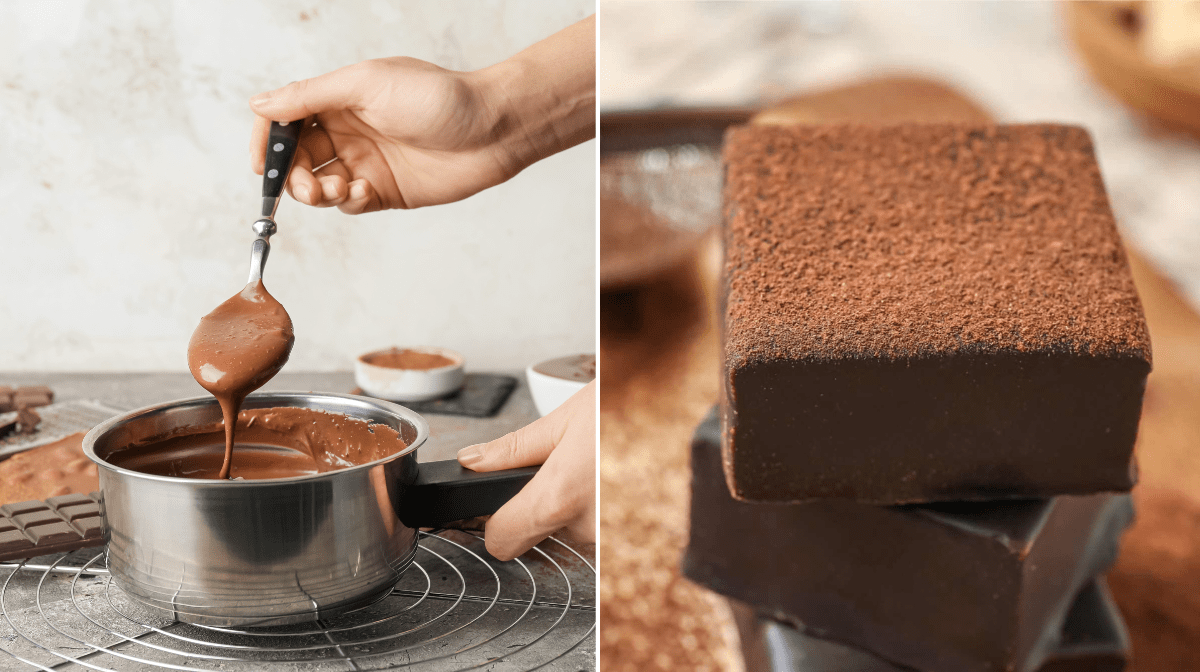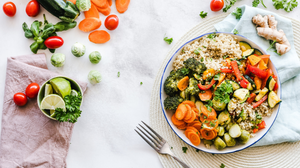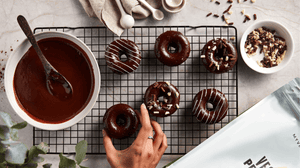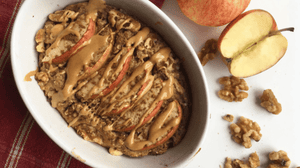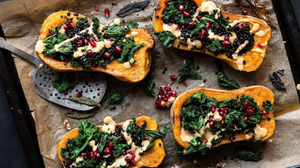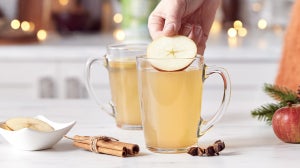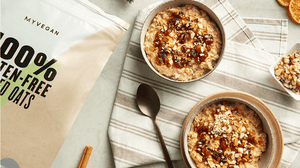
What Is A Yule Log?
A chocolate yule log is a traditional French dish that is used to represent the Christmas log that was burned in the fireplace during the 12 days of Christmas (25th Dec – 5th Jan). The ashes from the fire were then collected as they were thought to have healing properties for both human and plant life.
Vegan Yule Log: What’s The Difference?
Yule logs often contain egg whites to help give them the flexibility to roll. This recipe contains all the flavours and textures you’d expect to find in a yule log, but without the difficult rolling!
Equipment You’ll Need
2x large mixing bowls
1x heatproof bowl
2x wooden spoons
1x 8 inch square brownie tin OR 3x mini loaf tins.
Oven
Hob or microwave
Weighing scales
Greaseproof paper
Sharp knife
Measuring jug
Ingredients
180g plain flour: this recipe uses layers to create volume rather than rolling, so plain flour is used to stop the cakes from rising too high to stack.
2 tspns baking powder: a small amount of baking powder helps give the cakes a little bit of a rise.
½ tspn bicarbonate of soda: this is used to help balance the rise provided by the baking powder
20g Myvegan organic cacao powder: this provides a rich chocolate flavour which is essential for this recipe!
120g caster sugar
200ml soy milk
80ml vegetable oil
- For the decoration
50g vegan butter (hard block)
25g Myvegan organic cacao powder 250g icing sugar
50ml soy milk
150g dark chocolate
How To Make Vegan Mini Yule Log
Preheat the oven to 180C/350F. Line your tin with greaseproof paper. Take the butter out of the fridge at this point, as it’s easier to use when softened.
To a large mixing bowl, add the flour, baking powder, bicarbonate of soda, cacao powder and sugar. Mix gently.
Add the soy milk and oil to the dry ingredients and mix well until everything is well incorporated and thick glossy batter is formed.
Pour the cake batter into your tin. Bake for 20-25 minutes until a skewer comes out clean and the cake is soft and bouncy. Leave to cool in the tin.
To make the icing, add the softened vegan butter, cacao powder and icing sugar to a large bowl. It’s quite normal to be a bit lumpy at this point but try to keep mixing until most of the lumps are gone. Add the soy milk gradually, stirring after each addition. The final buttercream mixture should be quite thick but soft enough to spread.
Cut your cakes into 18 squares; sandwich together two squares with a layer of buttercream. Top the cake sandwiches with any remaining buttercream.
The chocolate can be melted in the microwave in 30 second bursts at full power. Make sure to stir after each heating period to prevent burning. Alternatively, add the chocolate to a heatproof bowl. Sit the bowl over a saucepan containing boiling water and stir continuously until melted. Once the melted chocolate is smooth, pour over each cake sandwich and leave to cool (you can pop it in the fridge to speed up this process).
Baking Tips
When coating the yule log, make sure the chocolate completely covers each of the sides. This will help them to maintain freshness so you can enjoy them for longer.
For extra decoration, why not top your yule log bite with a sprig of holly and some icing sugar? If you want even more of a chocolatey boost, add a square of MyVegan Protein chocolate – a blob of chocolate buttercream will help to keep the chocolate square in place.
If you feel confident baking, the chocolate squares can be cut even smaller to make 24 (or more) sandwiches! These make a perfect addition to a cup of tea or coffee, and really are bitesize!
Don’t worry if your cake seems a bit soft when it first comes out the oven – it will start to firm up as it cools. If it springs back slightly after pressing gently and/or a skewer comes out clean the cake is ready!
If you are determined to make a yule log with a signature roll, add 2tbsp of aquafaba to the mixture and use only 100ml soy milk in the cake batter. Also omit 1 tsp baking powder. Roll when the cake is fresh out of the oven, leave to cool, then gently unroll to fill with buttercream.
Vegan Yule Log Nutritional Information
Nutritional information for each mini yule log (makes 9)
| Energy | 463Kcal |
| Total fat | 20g |
| of which saturates | 6g |
| Total carbohydrates | 67g |
| of which sugars | 8g |
| Protein | 7g |
| Fibre | 1g |
Storage
Store the decorated yule logs in an airtight container. If you aren’t able to add the chocolate coating straight away, it will be fine to keep for 24-48 hours in an airtight container until you are ready to decorate it.
Take Home Message
Chocolate is integral part of most Christmas activities, and this recipe is easily adaptable. It contains all the core flavours and textures associated with a traditional yule log - Tag Myvegan on Instagram @myvegan and show us your best festive bakes!
FAQs
Is Swiss roll a Yule log?
Both Swiss rolls and Yule logs are rolled chocolate cakes filled with either buttercream or fresh cream. The main difference between the two is that Swiss rolls often have a simpler decoration and skip the chocolate topping.
Where does the Yule log cake originate from?
Yule logs originate from France, specifically Paris. It represents the log that was burned to keep households warm over the festive period.
What day do you eat the Yule log?
Some households eat yule log as an alternative to Christmas pudding. However, this recipe works well as a Christmas eve dessert, or can be made smaller to have as a dessert taster at Christmas parties.
What does a Yule log taste like?
A yule log should taste light and fluffy like a cake. The predominant flavour profile should be chocolate, chocolate and more chocolate!

Related Articles
